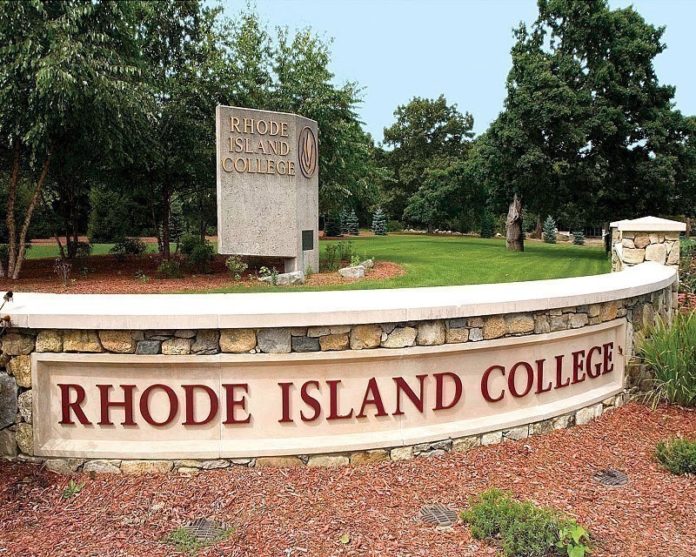
PROVIDENCE – Two of Rhode Island’s three state colleges have publicly disclosed that they are expecting enrollment declines for the upcoming fall, as the ongoing COVID-19 pandemic has led to fewer students slated to attend classes starting in the next few weeks.
The Community College of Rhode Island and Rhode Island College, which plan to deliver most of their courses online for the fall as a result of the pandemic – and had shut down their campuses in the spring – are seeing projected double-digit-percentage declines in enrollment from last year to this year.
The two institutions are also weighing several financial factors for operations, including what state aid will look like and if there’s another federal stimulus package coming to support higher education.
Community College of Rhode Island
CCRI, as of Aug. 3, has enrolled close to 10,000 students for the upcoming fall, but that headcount is down by 23% year-to-year, according to the college’s report submitted to the R.I. Council on Postsecondary Education. CCRI said in its report that its “best estimate” for fall enrollment will be lower by between 10% and 20% from last year when classes start in a few weeks.
CCRI Vice President of Student Affairs Sara Enright told Providence Business News Thursday that the pandemic has caused delays in people deciding whether or not to go to college and some students are not comfortable taking online classes. Initially, CCRI planned to have in-person learning in the fall, but 88% of its course offerings for the fall are either remote or distance learning, according to CCRI’s report to the council.
Plus, some students have been hit harder by the health crisis than others, particularly students from low-income families, Enright said.
“It has our students focused more on basic needs than pursuing higher education,” Enright said. “They’re trying to ensure that they have stable housing, have food to be able to put on the table.”
Enright said CCRI has made efforts to help students in financial trouble, including raising funds for emergency grants and scholarships. An additional $500,000 was raised through the CCRI Foundation to offer students such financial aid, Enright said. She also said CCRI is proactively reaching out to students to help with any needs they have.
With the new state budget still not passed, state aid is a big question mark. Enright said that roughly half of CCRI’s revenue comes from state aid and the college is “paying close attention” to what becomes of the new state budget, planning multiple financial scenarios in order to address what state aid becomes reality.
CCRI spokesperson Amy Kempe also said the college is awaiting on what happens on a possible new federal stimulus package if and when it’s approved by Congress. CCRI previously received $10.4 million from the Coronavirus, Aid, Relief and Economic Security Act, half of which went to emergency student aid.
“There’s several unknowns right now and we’re planning for different scenarios,” Kempe said. “But until we have a sense of the federal stimulus bill and what that will mean for the state budget is difficult to answer that question.”

Rhode Island College
RIC is currently seeing upcoming fall enrollment that is 12.9% lower than last year. More than 6,500 students attended RIC last year, according to the college’s respective report to the council, and now has 5,665 enrolled for this coming fall.
RIC’s undergraduate enrollment, per the report, has declined from 5,644 students last year to 4,881 this coming year – a 13.5% drop. Graduate enrollment at the Providence-based four-year college has declined by 9.5%, from 867 students to 784.
RIC spokesperson John Taraborelli said Thursday in an email that the enrollment decline is still a “preliminary number” as students are still registering for the fall. Final numbers won’t be available until after classes begin Aug. 31, he said. Taraborelli also said health and safety concerns, and economic impacts, surrounding the pandemic are likely “major contributing factors” in enrollment declining at RIC.
Most of RIC’s classes in the fall will be conducted online and only about 460 beds of student on-campus housing will be offered.
RIC’s financial aid budget has decreased by about $500,000, mostly due to a decrease in grants and scholarships – from $5.6 million for the 2021 fiscal year proposed in September 2019 to $5.1 million in July, the report states.
Much like CCRI, RIC cannot fully assess the impact of its operations with the new state budget not yet finalized, Taraborelli said. He said the college is anticipating a “shortfall” and is examining “all options” to mitigate the financial impact. According to RIC’s report to the council, RIC will need to make $10.4 million in cuts if the college does not receive additional state aid from the next budget.
“However, we remain optimistic that state leaders will prioritize investments in public higher education,” Taraborelli said.
University of Rhode Island
The University of Rhode Island expects a reduction from last year’s enrollment of about 3%, URI spokesperson Linda Acciardo said in an email Friday. Acciardo earlier said Thursday in an email that URI’s enrollment numbers for both new, continuing and transfer students are “holding steady,” and several families will be making final decisions about college in the fall “in the next few weeks.”
URI’s official fall enrollment figures won’t be released until after Oct. 15 as they are published annually around that time, Acciardo said.
The university did receive 23,831 applications from first-year students, about 1,000 more than last year, Acciardo said. She also said 9,500 students enrolled at URI over the summer, a 17% increase from last summer and the highest summer enrollment in URI’s history.
James Bessette is the PBN special projects editor, and also covers the nonprofit and education sectors. You may reach him at Bessette@PBN.com. You may also follow him on Twitter at @James_Bessette.
This story has been updated to include more information about the University of Rhode Island’s enrollment expectations.












